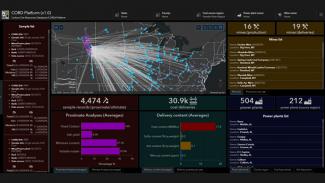Example and screenshot of CORD datasets used within the “CORD Platform” dashboard web application. The map (top center) displays coal delivery pathways extending from mine (black squares) to power plants (blue triangles and light blue highlighted circles) associated with the Powder River (Basin) coal source region (purple area on map). Datasets are summarized around the map within charts, lists, and graphs accordingly.
NETL’s new Carbon Ore Resources Database (CORD) is a valuable online tool to enable the recovery of high-value carbons and critical minerals from U.S. mining and industrial waste streams needed to support innovative manufacturing while lowering the environmental footprint of using domestic resources.
As the world seeks to reduce greenhouse gas emissions from conventional sources, there is a growing opportunity to address environmental and social needs through the beneficiation and alternative, carbon-neutral impact of U.S. carbon resources. To tap into these resources for maximum benefit requires large quantities of data to drive analyses and support regulatory, commercial and research decisions and breakthroughs. This is where CORD can serve as a game changer.
A recent addition to NETL’s digital Energy Data eXchange (EDX) platform, CORD collectively is a database and interactive tool that allows users to visualize and analyze the nation’s carbon ore resources in an integrated resource. CORD enables broader understanding and data-driven analyses of in-situ-, supply chain-, and consumer-based carbon resources by providing a single location to efficiently access carbon ore resource datasets for a range of applications and end uses. The public release of CORD is a major step towards realizing the DOE goal of utilizing carbon & mineral containing waste from mining, industrial operations, and impoundments as a carbon ore that can be mined and used as a manufacturing feedstock to make high value materials with strategic & economic importance to the United States.
This systematized database is the first open-source, national resource of publicly available U.S. carbon ore data. CORD presently is comprised of 399 data files and metadata from authoritative, but previously disparate sources, associated with carbon ore resources in the U.S. These data were originally produced and released from 18 national, state and university sources. The combined database was structured to include information and features representing aspects of carbon ore resources, including geochemical characteristics, geologic contextual source data, and infrastructure related features such as those associated with supply chain and distribution features.
The CORD database can be accessed and download as a standalone resource, but users can also utilize the CORD Platform. The CORD Platform is a geospatial web application and cloud-hosted tool that enables users to interact, query, and visualize information within CORD without needing specialty software or having to download the database. It offers the flexibility to utilize this information from any web-browser and enabled device.
This cloud-hosted instance of the CORD Platform represents a first for NETL, serving as the first application to leverage new data computing and virtualization infrastructure via the Lab’s EDX in a multi-cloud configuration (with Amazon Web Services and ESRI ArcEnterprise). This couples the power of DOE data, computing and data science expertise, increasing access, functionality and utilization of this resources to address an array of next-generation carbon ore-related projects.
NETL developed a database and online tool for visualization and analyses of geology, geochemistry, mining and delivery logistics, and environmental footprint information associated with utilizing coal for manufacturing high-value carbon products and critical minerals. CORD will support ongoing research at NETL focused on the sustainable extraction of carbon and critical minerals from existing mining and industrial waste streams and upcycling these materials to high-value carbons (e.g., graphite or graphene carbon nanomaterials) and/or critical minerals.
This development of CORD, using geo-data science methods, is detailed in a recent peer-reviewed paper published in the journal Data in Brief, which can be accessed here.
“CORD grants increased accessibility to systematized carbon ore resource datasets that can help scientists, analysts, developers, economists and engineers from a variety of organizations, such as mining companies, power plant operators, government agencies, non-governmental organizations and natural resource managers,” explained Devin Justman, a research scientist at NETL and first author of the paper. “By bringing so many data resources in one place, the pace at which projects proceed will vastly increase and the cost of those projects will be reduced while also making it easier and faster to inform stakeholders and decision makers.”
Future work on CORD is expected to focus on integration of new data, features and resources, such as integration of environmental and social justice related features and data, addition of coal and mining waste affiliated data, such as fly ash, waste piles, etc. Data infrastructure and resources like CORD are key to artificial intelligence and machine learning (AI/ML) enhanced research and technology breakthroughs. New AI/ML capabilities are playing an increasing role in the energy arena. They offer data to inform project investigations as well as validation resources to ensure decipherability to stakeholders and decision makers.
There are opportunities for other outside performers and entities to contribute additional data for integration into future updates of CORD. Interested parties can contact edx@netl.doe.gov for more information.
NETL is a U.S. Department of Energy national laboratory that drives innovation and delivers technological solutions for an environmentally sustainable and prosperous energy future. By leveraging its world-class talent and research facilities, NETL is ensuring affordable, abundant and reliable energy that drives a robust economy and national security, while developing technologies to manage carbon across the full life cycle, enabling environmental sustainability for all Americans.




